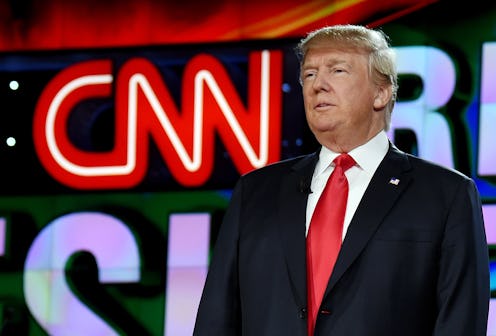News
CNN Refused To Air Trump's 100-Day "Fake News" Ad

President Trump is no fan of the mainstream media, with the possible exception of Fox News (though that depends — just ask former FNC anchor Megyn Kelly). But no single outlet has been targeted by Trump as regularly as CNN. According to The New York Times' handy "Trump's Twitter insult" tracker, no media outlet rakes in more presidential animus than CNN. Trump has labeled the network a "disgrace to their industry," an "enemy of the American people!," and often dub it "FAKE NEWS." Yesterday, CNN made clear it will not passively put up with being so described, refusing to air a pro-Trump commercial that employed the "fake news" attack against them.
The specific point of contention in the ad came when several news anchors from various media outlets were shown on screen overlaid with a "Fake News" banner. Rachel Maddow, Andrea Mitchell, Scott Pelley, George Stephanopoulos, and CNN's Wolf Blitzer were featured in the commercial. (Notably, no Fox News names appeared on that list.) In a statement, CNN clarified:
CNN requested that the advertiser remove the false graphic that says the mainstream media is "fake news." The mainstream media is not fake news, and therefore the ad is false. Per our policy, it will be accepted only if that graphic is deleted.
The standoff between CNN and the president further intensified with a released statement from the Donald J. Trump campaign, the entity responsible for the ad. Entitled "Fake News Station Refuses To Run Ad Highlighting The President's First 100 Days," the campaign's executive director, Michael Glassner, went on to accuse CNN of having an anti-Trump bias:
It is absolutely shameful to see the media blocking the positive message that President Trump is trying to share with the country. It's clear that CNN is trying to silence our voice and censor our free speech because it doesn't fit their narrative.
As Callum Borchers points out at The Washington Post, the campaign arm of Trump's enterprise is "still active," and has already (get ready) filed the necessary paperwork for a reelection run in 2020. Borchers shows that CNN's rationale for barring the ad — calling legitimate new outlets purveyors of "fake" stories qualifies as false advertising — is a completely fair decision. Borchers does so by linking to the dictionary definition of "fake." (Maybe he's a fellow fan of the Merriam-Webster strategy of making sure a word's meaning isn't lost for good by political mischief and misuse.)
Either way, the feud between Trump and CNN continues, with no resolution in sight.